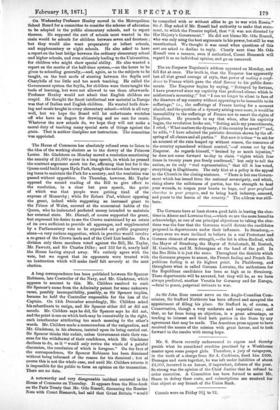The ex-Emperor Napoleon's address appeared on Monday, and fell flat
at once. The truth is, that the Emperor has apparently lost all that grand courage of style, that power of making a confi- dence to France which gave the chief flavour to his public docu- ments. The Emperor begins by saying, " Betrayed by fortune, I have preserved since my captivity that profound silence which is misfortune's mourning ;" but "I can no longer be silent in face of the disasters of my country without appearing to be insensible to its sufferings;" i.e., the sufferings of France having for a moment abated, and the question of a dynasty arising once more, it would be insensibility to the sufferings of France not to assert the rights of Napoleon. He proceeds to say that when, after his captivity began, the revolution broke out, " Setting aside my preseutiments, I cried, What matters the dynasty, if the country be saved ?'" and, he adds, " I have admired the patriotic devotion shown by the off- spring of all classes and all parties." But now it is time " to ask for an account of the ruin heaped up without reason, the resources of the country squandered without control,"—of course not by the Emperor. As regards himself, " bruised by so much injustice," he does not come forward to-day to claim "rights which four times in twenty years you freely confirmed," but only to tell the nation, as its only " real representative," that till it has voted, everything is illegitimate. The only hint at a policy is the appeal to the Church in the closing sentence. " There is but one Govern- ment which has issued from the national sovereignty, and which, rising above the selfishness of parties, has the strength to heal your wounds, to reopen your hearts to hope, and your profaned churches to your prayers, and to bring back industry, concord, and peace to the bosom of the country." The address was still- born.


































 Previous page
Previous page